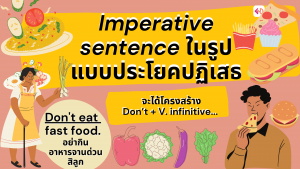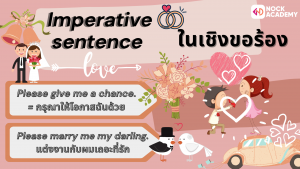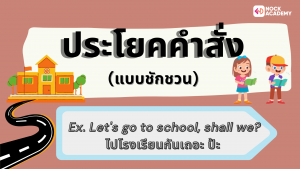exclamation แปลว่า: คุณกำลังดูกระทู้
สวัสดีค่ะนักเรียนชั้นป.5 ที่น่ารักทุกคน วันนี้ครูจะพาไปเรียนรู้เกี่ยวกับ การใช้ประโยคคำสั่ง หรือ Imperative sentence ในชีวิตประจำวัน กันนะคะ
ซึ่งเราจะเจอประโยคเหล่านี้ตั้งแต่ตื่นนอน ทานข้าว เดินไปโรงเรียน ไปดูหนัง ข้ามถนน ข้ามสะพาน ขึ้นแท็กซี่ และในกิจกรรมอื่นๆอีกมากมาย หากว่าพร้อมแล้วก็ไปลุยกันเลย
Table of Contents
รูปแบบและโครงสร้างประโยคคำสั่ง Imperative sentence
คือประโยคที่เจอบ่อยเมื่อต้องพูด ให้คำคำปรึกษา แนะนำ ตักเตือน ออกคำสั่ง ขอร้อง บอกทาง และโดยทั่วไปแล้วจะขึ้นต้นประโยค
ด้วยกริยา (Verb) ในรูป Infinitive หรือ กริยาช่องที่ 1 ไม่ผัน ลงท้ายด้วย full-stop (.) หรือ exclamation mark (!) ขึ้นอยู่กับบริบทของการใช้
- Imperative sentence ในรูปแบบประโยคบอกเล่าจะ ใช้ Verb base form (V.1) ขึ้นต้นประโยคแล้วตามด้วยสิ่งที่จะสั่งให้ทำ หรืออาจใช้ Verb แค่คำเดียวก็ได้ เช่น
Move out! แปลว่า ออกไป
Move on. แปลว่า เดินหน้าต่อไปได้แล้วนะ
Stay strong. แปลว่า เข้มแข็งหน่อยสิ
Go for it. แปลว่า ลุยเลย
Stay focus. แปลว่า มีสมาธิหน่อยสิ
อธิบายเพิ่มเติม: ถ้าต้องการให้ประโยค Imperative สุภาพยิ่งขึ้น ควรเติม ‘do’ ไว้ข้างหน้า ตัวอย่างเช่น
Do study hard. แปล ต้องขยันเรียนนะ
Do come. แปล ต้องมานะ
Do go to school. แปล ต้องไปโรงเรียนนะ
Do have breakfast every morning. แปล ต้องทานอาหารเช้าทุกๆ เช้านะ
Do miss me. แปล คิดถึงฉันด้วยนะ
การใช้ กริยา “Be…” ขึ้นต้นประโยค
Be + คำนาม หรือ article + คำนาม
Be a good boy.
จงเป็นเด็กดีBe a good role model.
จงเป็นตัวอย่างที่ดีBe brave.
จงกล้าหาญBe kind.
จงมีเมตตา
Imperative sentence ในรูปแบบประโยคปฏิเสธ

หากต้องการทำให้เป็นรูปแบบประโยคปฏิเสธ เพียงแค่วาง do not (don’t) หน้าคำกริยา จะได้โครงสร้าง
Don’t + V. infinitive เช่นDon’t eat late.
= อย่าทานข้าวเหลด
Don’t copy a homework.
= อย่าลอกงานเพื่อนDon’t go alone.
= อย่าไปคนเดียว
เพิ่มเติม: Imperative sentence ที่ขึ้นต้นด้วยกริยา ‘be’ ก็เช่นเดียวกัน เพียงวาง don’t หน้ากริยา be เช่น
Don’t be silly.
= อย่างี่เง่าDon’t be noisy here.
= อย่าเสียงดังที่นี่Don’t be grumpy.
= อย่าวีน (อย่าอารมณ์เสียเลย)
Imperative sentence ในเชิงขอร้อง

เราสามารถใช้ Imperative sentence ในเชิงขอร้องได้ โดยเพียงเติม Please (กรุณา)
เข้าไปวางไว้หน้าหรือท้ายประโยคก็ได้ เพื่อให้ดูสุภาพขึ้น เช่น
-
Please
give me a chance.
= กรุณาให้โอกาสฉันด้วย
- Walk faster,
please.
= กรุณาเดินเร็วขึ้นด้วย
ประโยคคำสั่ง(แบบชักชวน)

ประโยคคำสั่งที่ใช้ไนความหมายแบบชักชวนนี้ มีอยู่รูปเดียวคือ Let’s (Let us) เป็นการชักชวน แบบเป็นกันเอง เช่น เพื่อนชวนเพื่อนออกไปกินข้าว พี่ชวนน้องไปเที่ยว เป็นต้น โดยที่ผู้ถามอาจจะไม่ต้องการคำตอบแต่เป็นเพียงการชวนไปทำอะไรบางอย่าง อย่างมีจุดมุ่งหมาย จะเรียกว่าสั่งแบบชวนแบบนั้นก็ได้ค่ะ ซึ่ง มีโครงสร้าง ดังนี้นะคะ
โครงสร้างประโยคคำสั่ง (แบบชักชวน)
” Let’s + V. infinitive…”
Ex. Let’s go to school, shall we?
ไปโรงเรียนกันเถอะ ป้ะ
ตัวอย่าง
Let’s go to the canteen, shall we?
ไปโรงอาหารกันเถอะ ป้ะ
เพิ่มเติม: บางประโยคอาจจะมีคำว่า Shall we? ต่อท้ายด้วยเพื่อเป็นการชักชวน
แปลว่า ไปกันเถอะ(ป้ะ) เข้ามาด้วย ซึ่งใช้กับเพื่อนหรือการชวนคนสนิท
ประโยคแนะนำที่เจอในชีวิตประจำวัน
ประโยคคำแนะนำส่วนใหญ่แล้วจะเจอในรูปแบบของประโยคบอกเล่าซึ่งจะมีความหมายในทางเสนอแนะมากกว่า บางครั้งก็เป็นการให้ความคิดเห็นและแนะว่าควรทำหรือไม่ควรทำสิ่งใดสิ่งหนึ่งถือเป็นการเสนอแนะโดยตรงมีโครงสร้างดังนี้ค่ะ
ตัวอย่าง
I suggest (that) you should take a bus to school.
ฉันขอเสนอแนะว่า เธอควรขึ้นรถบัสไปโรงเรียน
I advise we should go jogging everyday.
ฉันขอแนะนำว่า เราควรไปวิ่งทุกวัน
I propose that we should not miss the flight.
ฉันขอเสนอว่า ว่าเราไม่ควรตกเที่ยวบิน
I ought to help my mom wash the dishes.
ฉันควรจะ ช่วยคุณแม่ล้างจาน
I advise you should water your plants every day.
ฉันแนะนำให้คุณรดน้ำต้นไม้ทุกวัน
ประโยคเชิง “ชักชวน ” ในชีวิตประจำวัน
ในชีวิตประจำวันของเรานั้น ล้วนจะต้องเจอกลุ่มประโยคคำถามในเชิงชักชวน และการเสนอแนะที่ใช้เป็นรูปแบบคำถามนั้นถือเป็น การเสนอแนะชักชวนทางอ้อม เพื่อแสดงถึงการเกรงใจซึ่งเป็นนิสัยที่คนไทยส่วนใหญ่มีอยู่แล้ว ต้องการคำตอบหรือการตกลงไม่ตกลงจากอีกฝ่ายหนึ่งด้วย ประโยคคำถามที่ใช้มีดังนี้
- ถามแบบรูปประโยค Yes/No Question :
Shall we…………?
เรา………กันดีมั้ย
- ถามแบบรูปประโยค Wh- Questions :
Why don’t we………..?
เรา .. … กันมั้ย
How about……….?
…………….ดีมั้ย
- ถามแบบรูปประโยค Indirect Questions :
I wonder if we…
ฉันไม่ทราบว่า เรา………….มั้ย
ตัวอย่าง:
Shall we read books at the library?
เราไปอ่านหนังสือที่ห้องสมุดกันเถอะ
Why don’t we walk to school?
ทำไมเราไม่เดินไปโรงเรียนกันนะ (หรือ เดินไปโรงเรียนกันดีกว่า)
How about playing a football after school?
เย็นนี้ เล่นฟุตบอลกันเถอะ
I wondered if we should sit with them?
ฉันว่าเราควรไปนั่งกับพวกเขากันเถอะ
Shall we book a movie ticket?
เราจองตั๋วหนังกันดีมั้ย
Shall we go to the wedding?
เราควรไปงานแต่งกันมั้ยI wondered if we can wear a mask during Covid-19 everyday?
ฉันว่าเราควรใส่หน้ากากทุกวันในช่วงโควิดนี้How about eating out today?
วันนี้ไปกินข้าวนอกบ้านกันดีกว่า
การตอบรับ (Accepting)
Yes! ได้เลย
Of course. แน่นอน
That’s a good/ great idea/ What a good idea.
เป็นความคิดที่ดีมากๆThat’s interesting.
น่าสนใจดีYes/ Of course/ Certainly/Absolutely/ Surely
ไปแน่นอน
การตอบปฏิเสธ (Refusing)
Sorry, I can’t go.
ขอโทษด้วยนะ ฉันไปไม่ได้Sorry, I already had a plan.
ขอโทษนะพอดีว่ามีแผนแล้วI’m afraid I won’t be able to come.
ดิฉันเกรงว่าคงจะไปไม่ได้นะคะSorry, I’d love to but I already had an appointment.
ขอโทษที ฉันก็อยากไปนะ แต่บังเอิญว่าดันฉันมีนัดแล้วอะI really don’t think I can go, and I must say sorry.
ฉันคิดว่าฉันคงจะไปไม่ได้จริงๆค่ะ ต้องขอโทษนะคะ
ครูหวังเป็นอย่างยิ่งว่านักเรียนที่น่ารักทุกคนจะได้รับประโยชน์และความรู้จากการอ่านบทความนี้นะคะ ขอให้สนุกและมีความสุขกับการเรียนนะคะทุกคน
เลิฟๆ
+1
[NEW] อนิจฺจา วต สงฺขารา (บาลีวันละคำ 171) – ธรรมธารา | exclamation แปลว่า – NATAVIGUIDES
อนิจฺจา วต สงฺขารา
อ่านว่า อะ-นิด-จา วะ-ตะ สัง-ขา-รา
เป็นคำบาลีที่คุ้นหูคนไทยมากอีกคำหนึ่ง เป็นข้อความบาทหนึ่งหรือวรรคหนึ่งในคาถา (= คำประพันธ์) 4 วรรค หรือ 1 บท จะได้ยินเวลาไปร่วมพิธีบำเพ็ญกุศลอุทิศให้ผู้ตาย เช่น สวดพระอภิธรรม ตอนพระทำพิธีบังสุกุล
คาถาบทนี้มีข้อความเต็มๆ ว่า
อนิจฺจา วต สงฺขารา
อุปฺปาทวยธมฺมิโน
อุปฺปชฺชิตฺวา นิรุชฺฌนฺติ
เตสํ วูปสโม สุโข.
(สังขารทั้งหลายไม่เที่ยงหนอ
มีการเกิดขึ้นและดับไปเป็นธรรมดา
เกิดขึ้นแล้วก็ดับไป
การเข้าไประงับดับสังขารเหล่านั้นเสียได้ เป็นความสุข)
อนิจฺจา วต สงฺขารา
ประกอบด้วยคำ 3 คำ คือ –
1- “อนิจฺจา” แปลว่า ไม่เที่ยง ไม่แน่นอน ไม่คงที่ ไม่ถาวร ไม่ยั่งยืน ไม่คงทน
2- “วต” นักบาลีไทยแปลว่า “หนอ” ฝรั่งแปลว่า surely, certainly, indeed, alas ! (part of exclamation) ไทยแปลจากฝรั่งว่า แน่ละ, แน่นอน, จริงๆ, โธ่ !
3- “สงฺขารา” แปลว่า สิ่งที่ถูกปัจจัยปรุงแต่ง, สิ่งที่เกิดจากเหตุปัจจัย, ร่างกายและจิตใจ
คำแปลที่นิยมพูดกันคือ “สังขารทั้งหลายไม่เที่ยงหนอ” (รู้คำแปลแต่ละคำแล้ว สามารถนำมาปรับแต่งได้ตามความเหมาะสม)
คำนี้มักมีผู้เขียนคลาดเคลื่อน เช่น
– อนิจจัง วัฏสังขารา
– อนิจจา วัฏสังสารา
โปรดสังเกต :
– “อนิจจา” ไม่ใช่ “อนิจจัง”
– “วต” ไม่ใช่ “วัฏ” (และต้องแยกเป็นคนละคำ)
– “สังขารา” ไม่ใช่ “สังสารา”
คำที่ถูกต้อง : อนิจฺจา วต สงฺขารา
: คุ้นหูอย่างเดียวอาจเข้าใจผิด
: คุ้นตาอีกสักนิดช่วยให้มั่นใจ
บาลีวันละคำ (171)
26-10-55
นิจฺจ (บาลี-อังกฤษ)
(คุณ.) (เวท. นิตฺย การสร้างรูปคุณ. จาก นิ, หมายถึง “ลงไปข้างล่าง” ต่อไป, เรื่อยไปไม่รู้จักจบ ตามมติ ว่า แต่เดิมหมายถึง “ภายใน, ไม่หรูหราโอ่อ่า”) [Vedic nitya, adj. — formation fr. ni, meaning “downward”=onward, on and on; according to Grassmann (Wtb. z. Rig Veda) originally “inwardly, homely”]
เป็นนิตย์, ต่อเนื่องกันไป, ถาวร constant, continuous, permanent
คำที่เป็นไวพจน์ นิจฺจ ธุว สสฺสต อวิปริณามธมฺม
(นปุง.,ก.วิ.) นิจฺจํ ชั่วนิรันดร, เสมอ, เป็นนิตย์, เสมอๆ (เป็นไวพจน์กับ สทา) perpetually, constantly, always (syn. sadā)
อนิจฺจ (คุณ; อนิจฺจํ นปุง.,นาม.) ไม่ถาวร, ไม่คงที่, ความไม่ถาวร unstable, impermanent, inconstant; (นปุง.) ความไม่ยั่งยืน, ความไม่คงทน, ความไม่ถาวร evanescence, inconstancy, impermanence
อนิจฺจ ค. (พจนานุกรมศัพท์บาลี)
(ธรรมหรือขันธ์ ๕) ไม่เที่ยง, ไม่ยั่งยืน
วต (บาลี-อังกฤษ)
แน่ละ, แน่นอน, จริงๆ, โธ่ !
part of exclamation : surely, certainly, indeed, alas !
วฏฺฏ ค. (พจนานุกรมศัพท์บาลี)
กลม, เป็นวงกลม.
วฏฺฏ นป.
วงกลม, การหมุนเวียน.
สังขาร (ประมวลศัพท์)
1. สิ่งที่ถูกปัจจัยปรุงแต่ง, สิ่งที่เกิดจากเหตุปัจจัย เป็นรูปธรรมก็ตาม นามธรรมก็ตาม ได้แก่ขันธ์ ๕ ทั้งหมด, ตรงกับคำว่า สังขตะ หรือ สังขตธรรม ได้ในคำว่า “สังขารทั้งหลายทั้งปวงไม่เที่ยง” ดังนี้เป็นต้น
2. สภาพที่ปรุงแต่งใจให้ดีหรือชั่ว, ธรรมมีเจตนาเป็นประธานที่ปรุงแต่งความคิด การพูด การกระทำ มีทั้งที่ดีเป็นกุศล ที่ชั่วเป็นอกุศล ที่กลางๆ เป็นอัพยากฤต ได้แก่เจตสิก ๕๐ อย่าง (คือ เจตสิกทั้งปวงเว้นเวทนาและสัญญา) เป็นนามธรรมอย่างเดียว, ตรงกับสังขารขันธ์ ในขันธ์ ๕ ได้ในคำว่า “รูปไม่เที่ยง เวทนาไม่เที่ยง สัญญาไม่เที่ยง สังขารไม่เที่ยง วิญญาณไม่เที่ยง” ดังนี้เป็นต้น;
อธิบายอีกปริยายหนึ่ง สังขารตามความหมายนี้ยกเอาเจตนาขึ้นเป็นตัวนำหน้า ได้แก่สัญเจตนา คือเจตนาที่แต่งกรรมหรือปรุงแต่งการกระทำ มี ๓ อย่างคือ
๑. กายสังขาร สภาพที่ปรุงแต่งการกระทำทางกาย คือ กายสัญเจตนา
๒. วจีสังขาร สภาพที่ปรุงแต่งการกระทำทางวาจา คือ วจีสัญเจตนา
๓. จิตตสังขาร หรือ มโนสังขาร สภาพที่ปรุงแต่งการกระทำทางใจ คือ มโนสัญเจตนา
3. สภาพที่ปรุงแต่งชีวิตมี ๓ คือ ๑. กายสังขาร สภาพที่ปรุงแต่งกาย ได้แก่ อัสสาสะ ปัสสาสะ คือลมหายใจเข้า ลมหายใจออก ๒. วจีสังขาร สภาพที่ปรุงแต่งวาจา ได้แก่วิตกและวิจาร ๓. จิตตสังขาร สภาพที่ปรุงแต่งใจ ได้แก่สัญญาและเวทนา
สงฺขาร ป. (พจนานุกรมศัพท์บาลี)
การปรับปรุง, การตกแต่ง; ร่างกายและจิตใจ.
สํสาร ป. (พจนานุกรมศัพท์บาลี)
การท่องเที่ยว, การเวียนว่ายตายเกิด.
สํสาร (บาลี-อังกฤษ)
1. วัฏสงสาร, (ตามตัว) การเดินทาง transmigration, lit. faring on
2 .การเคลื่อนไป, การหมุนเวียน moving on, circulation
สังสารวัฏ (ประมวลศัพท์)
ภพที่เวียนเกิดเวียนตาย, การเวียนว่ายตายเกิดอยู่ในโลก; สังสารวัฏฏ์ หรือ สงสารวัฏ ก็เขียน
วฏฺฏํ สํสาโร วิวฏฺฏํ นิพฺพานํ (เนตติปกรณ์ อ้างในบาลี-อังกฤษ)
สังสารวัฏ
[-สาระ-] น. การเวียนว่ายตายเกิด, สงสารวัฏ หรือ วัฏสงสาร ก็ว่า. (ป. สํสารวฏฺฏ).
อนิจจัง วัฏสังขารา
(Ohm Pavaphon อนิจจัง วัฏสังขารา อยู่ไปอยู่มามันก็เลยดับสูญไปทั้งป้ายทั้งตึกให้ได้ปลง – ๒๕ ตุลาคม ๒๕๕๕)
อนิจฺจา วต สงฺขารา
เป็นคำของใครในพระไตรปิฎก ?
๑. ในมหาปรินิพพานสูตร ที.มหา. ๑๐/๑๔๗ เป็นคำของท้าวสักกะ
๒. ในมหาสุทัสสนสูตร ที.มหา. ๑๐/๑๘๖ เป็นพระพุทธพจน์
๓. ในนันทสูตร สํ.สคาถ. ๑๕/๒๕ เป็นพระพุทธพจน์
๔. ในสูตรที่ ๑๐ วรรคที่ ๒ อนมตัคคสังยุต สํ.นิทาน. ๑๖/๔๖๑ เป็นพระพุทธพจน์
๕ .ในเถรคาถา ๒๖/๓๐๐ เป็นคำของพระมหาโมคคัลลานเถระ
๖. ในมหาสุทัสสนชาดก เอกนิบาต ๒๗/๙๕ เป็นพระพุทธพจน์
๗. ในอปทาน ภาค ๑ ๓๑/๒๑ เป็นคำของพระโสปากเถระ
๘ .ในอปทาน ภาค ๑ ๓๑/๓๔๑ เป็นคำของพระธัมมสวนิยเถระ
๙. ในอปทาน ภาค ๒ ๓๒/๑๗ เป็นคำของพระเอกธัมมสวนิยเถระ
สรุปว่า อนิจฺจา วต สงฺขารา เป็นพระพุทธพจน์ และมีผู้นำไปกล่าวในโอกาสต่างๆ
—————
สำนวนที่เขียนไว้เดิม
อนิจฺจา วต สงฺขารา
อ่านว่า อะ-นิด-จา วะ-ตะ สัง-ขา-รา
เป็นคำบาลีที่คุ้นหูคนไทยมากอีกคำหนึ่ง (เวลาไปร่วมพิธีบำเพ็ญกุศลอุทิศให้ผู้ตาย เช่น สวดพระอภิธรรม) เป็นข้อความวรรคหนึ่งในคำประพันธ์ 4 วรรค ประกอบด้วยคำ 3 คำ คือ –
1- “อนิจฺจา” แปลว่า ไม่เที่ยง ไม่แน่นอน ไม่คงที่ ไม่ถาวร ไม่ยั่งยืน ไม่คงทน
2- “วต” นักบาลีไทยแปลว่า “หนอ” ฝรั่งแปลว่า surely, certainly, indeed, alas ! (part of exclamation) ไทยแปลจากฝรั่งว่า แน่ละ, แน่นอน, จริงๆ, โธ่ !
3- “สงฺขารา” แปลว่า สิ่งที่ถูกปัจจัยปรุงแต่ง, สิ่งที่เกิดจากเหตุปัจจัย, ร่างกายและจิตใจ
คำแปลที่นิยมพูดกันคือ “สังขารทั้งหลายไม่เที่ยงหนอ” (รู้คำแปลแต่ละคำแล้ว สามารถนำมาปรับแต่งได้ตามความเหมาะสม)
คำนี้มักมีผู้เขียนคลาดเคลื่อน เช่น
– อนิจจัง วัฏสังขารา
– อนิจจา วัฏสังสารา
โปรดสังเกต :
– “อนิจจา” ไม่ใช่ “อนิจจัง”
– “วต” ไม่ใช่ “วัฏ” (และต้องแยกเป็นคนละคำ)
– “สังขารา” ไม่ใช่ “สังสารา”
: คุ้นหูอย่างเดียวอาจเข้าใจผิด คุ้นตาอีกสักนิดช่วยให้มั่นใจ
บาลีวันละคำ (171)
26-10-55
ดูโพสต์ในเฟซบุ๊กของครูทองย้อย
Punctuation in English | Punctuation At The End Of A Sentence| 1st Grade – Kids Academy
Thousands of parents and educators are turning to the kids’ learning app that makes real learning truly fun. Try Kids Academy with
3day FREE TRIAL! https://bit.ly/2GuGyL2
Punctuation in English | Punctuation At The End Of A Sentence| 1st Grade
Punctuation is a very important part of written English, it clears the meaning of words and expresses what is being said in the right manner. Without punctuation, the sentences would remain confused and the meanings will be unclear. For 1st grade student is an important part if the curriculum and the kid must have a strong grip on it.
Starting with the very basics, let’s look at the ending punctuations. These punctuations are used at the end of the sentences. All sentences end with a punctuation mark, which is what marks the end of the sentence. Depending on the tone of the sentence the appropriate punctuation is used with it. Mostly three kinds of punctuation marks are used, either a period (.), a question mark (?) or an exclamation mark (!).
Let’s take a look at some examples.
Most sentences end with a period. For example:
1. The dog is big.
2. He is Adam.
3. This is an apple.
4. I have a car.
All of these sentences are ending with a period. These are simple sentences with clear meanings.
Question sentences end with a question mark. The sentences which enquiring about something are referred to as question sentences. For example:
1. What is your name?
2. Where is your car?
3. When will you come?
4. How old are you?
These are all asking a question and hence are ending with a question mark. The question sentences ask six questions:
1. What?
2. When?
3. Who?
4. Where?
5. Why?
6. How?
Sentences which represent some kind of extreme feeling end with an exclamation point. For example:
1. I am going to a party!
2. That is my favorite color!
3. I love it!
4. Yay!
So these are the basic ending punctuation lessons that English grammar is made up of. They are an important part of the English grammar lessons and the kid must have a sound understanding of them.
Subscribe to our channel: https://goo.gl/iG2Bdr
TalentedAndGifted LearnWithKidsAcademy
Kids Academy Talented and Gifted Program for kids aged 210:
Connect with us on :
App Store: https://smart.link/59833db06a6b8
Google Play: https://smart.link/597210af6eb83
Our website: http://www.kidsacademy.mobi
Facebook: https://www.facebook.com/KidsAcademyC…
Twitter: https://twitter.com/KidsAcademyCo
นอกจากการดูบทความนี้แล้ว คุณยังสามารถดูข้อมูลที่เป็นประโยชน์อื่นๆ อีกมากมายที่เราให้ไว้ที่นี่: ดูเพิ่มเติม

ติว TOEIC: Correlative Conjunction (คำเชื่อมที่มาเป็นคู่ๆ) มีอะไรบ้าง? มาดูกันเลยค่ะ
Correlative Conjunctions ได้แก่พวก either or, neither nor, not only but also, both and ซึ่งมักจะมาเป็นคู่ๆ ดังนั้นในข้อสอบ TOEIC ถ้าเจอเรื่องนี้จะมีวิธีสังเกตยังไงบ้าง ตามครูดิวมาดูเลยค่ะ
✿ คอร์สครูดิว ติว TOEIC มีอะไรให้บ้าง? ✿
✅ติวเทคนิค TOEIC Grammar ที่ใช้สอบ ครบถ้วน สอนจากพื้นฐาน เรียนได้ทุกคนแน่นอน
✅เก็งศัพท์ TOEIC ออกข้อสอบบ่อยๆ ให้ครบ ไม่ต้องเสียเวลาไปนั่งรวบรวมเอง
✅ ติวข้อสอบ New TOEIC ล่าสุด ทั้ง TOEIC Reading และ Listening
✅สามารถสอบถามข้อหรือจุดที่สงสัยได้ตลอด
✅การันตี 750+ (ถ้าสอบแล้วไม่ถึง สามารถทวนคอร์สได้ฟรี)
📣 ถ้าไม่อยากพลาดคลิปดีๆแบบนี้ อย่าลืมกด ❤️ Subscribe ❤️กันนะคะ

How to Pronounce Exclamation | Exclamation Pronunciation
Learn how to pronounce \”exclamation\” with the American Pronunciation Guide (\”APG\”)!
The American Pronunciation Guide is devoted to descriptive linguisticsi.e., the study of the internal phonological, grammatical, and semantic structures of languages without reference to the history of the language or comparison with other languages. We believe that the best way to learn how to say \”exclamation\” (or any other word) is to listen to the pronunciation of our peers. To help foster such descriptive learning, we provide videos combining relevant clips from popular culture. Enjoy!
SOURCES
Bretton Woods Then and Now, Dartmouth, available at https://www.youtube.com/watch?v=cECouzfzqnM
Can We Hear Shapes? | Infinite Series | PBS Digital Studios, PBS Infinite Series, available at https://www.youtube.com/watch?v=bkJZbyrfxQ
Dr. Samantha Nutt | Talks at Google, Talks at Google, available at https://www.youtube.com/watch?v=XaqowGjdDhY
US Communications at a Crossroads: A Conversation with FCC Chair Tom Wheeler, The Berkman Klein Center for Internet \u0026 Society, available at https://www.youtube.com/watch?v=9s_EpWjPKwM
Week 1, CS50, available at https://www.youtube.com/watch?v=NQsKYXtShMY
Authors@Google: Mignon Fogarty, Talks at Google, available at https://www.youtube.com/watch?v=_jOH7FvR83g
Crazy Sexy Interview with Kris Carr, Marie Forleo, available at https://www.youtube.com/watch?v=kQrzeRL2Zkc
pronunciation pronounce ipronounce

Exclamation
Exclamation
(noun):
Meaning: a sudden outburst of emotion expressing surprise, anger or pain
Usage:
The joyous exclamation on my face.
Brought to you by illustrate The Video Dictionary.
Illustrate is an innovative app that uses animated videos to showcase actual conversations as a means to explain and elaborate the meanings of words. It is an excellent resource for vocabulary relevant to SAT, GRE, GMAT, ACT, MCAT and LSAT. illustrate explains the meaning and usage of words from the English language using easy to understand videos. The animated videos showcase actual scenarios and conversations explaining the context and proper usage of the word.
Download App from:
iOS App Store: http://bit.ly/1yMeMye
Google Play Store: http://bit.ly/128dS0j
Windows Phone Store: http://bit.ly/1z723q4
More Info.:
Company: http://www.mocept.com
Facebook: http://on.fb.me/1A0urdF
Email: [email protected]

Exclamations in English!!!
http://www.engvid.com/ What a great student you are! How wonderful! In this video, I will teach you about \”how\” and \”what\” exclamations such as \”How exciting!\” \”What a cute couple!\” Exclamations are very important in conversational English, and will help you to sound more natural in your English. Watch this video to find out more. What a great idea! http://www.engvid.com/exclamationsinenglish/
TRANSCRIPT
Hello. My name is Emma, and in today’s lesson, we will be talking about exclamations: How exciting! So what is an \”exclamation\”? Well, \”How exciting!\” is an example of an exclamation. So an \”exclamation\” is, pretty much, something you say so this is used in conversation English, not written when you want to show you are surprised about something, okay? \”Whoa! What a big car!\”, for example. You can also use it when you want to emphasize something when you want to show you really mean something. So for example, yesterday, my grandmother gave me this beautiful ring. So what did I say when I got the ring? I said, \”What a beautiful ring, Nanny!\” I call my grandma \”Nanny\”. I also said, \”How beautiful!\” These are examples of exclamations. So we use them a lot in conversation.
So let’s look at how you make an exclamation. Okay, so first, we will look at \”how\”. We make a \”how\” exclamation by taking \”How + an adjective!\” If you remember, an \”adjective\” is something that describes a noun. Example: exciting, interesting, big, small, medium, beautiful, pretty, cool. These are all adjectives. So for example, \”How exciting!\” this is an exclamation. And do you notice what is at the end of this sentence? That’s right. An exclamation mark. So maybe you’re talking to your friend; they’re telling you about their job; what’s their job? Maybe they’re an astronaut. They go to space. What would you say to them? You’d say, \”How exciting!\” Meaning you’re very excited for them. \”How strange!\” So again, \”How + adj.!\” There is no verb. And we have, again, our exclamation mark. \”How strange!\” Maybe you would say this if you saw a haunted house or a weird man or you saw someone doing something very strange. You would say, \”How strange!\” Another example: Maybe you see a baby. Your friend just had a baby. You’re looking at it. It has these nice, big eyes. What do you say? \”How cute!\” I always say this when I see puppies and kittens. \”How cute!\” Okay, so again, no verb, and if you write it, it has an exclamation mark. Okay. So these are our \”how\” exclamations.
Let’s look at our \”what\” exclamations. It’s on this side. It’s the same idea. We use this when we’re showing surprise, or we really want to show we mean something. So the formula it’s like math: We take \”What + a + adj. +noun!\” So let’s isolate this. \”What + a + adjective + noun + !\” So what are some examples of this? If I saw a movie I really liked this movie. Maybe it’s an action movie. At the end, I might say, \”Wow! What an exciting movie!\” Okay? \”Exciting\” is your adjective; \”movie\” is your noun. In this case, there is no verb, but you have to be careful. You must remember \”a\” or \”an\”. Okay? So it’s either \”what a\”, \”what an\”. Let’s look at another example: \”What a strange man.\” Okay, so again, maybe you see a man doing something very strange or you meet someone; you think they’re very strange. \”Oh, what a strange man!\” Again: \”What + a + adjective is ‘strange’ + noun is ‘man’\”. Okay? Another example: \”Oh, what a cute baby!\” \”What a cute baby!\” And again, what is your adjective? Cute. What is the noun? Baby. Is there a verb? No. Is there an exclamation mark? Yes. That’s the exclamation mark. Okay.
So these are some examples of exclamations, but there’s another way to do this. So we have with \”how\”. Maybe you have a sentence: \”She is pretty.\” \”Oh, she’s very pretty.\” \”She is pretty.\” You can say this a different way. Especially in conversation. You can say, \”How pretty she is.\” So it’s just like what we did up here, but we are adding the subject and the verb. And notice the order: \”How pretty she so subject first is verb last.\” Okay? \”How exciting the movie was!\” \”How strange the man is!\” \”How cute the babies are!\” Here are some more examples of this.
Now, we can do something similar with \”what\” exclamations. This sentence: \”You have big eyes.\” There’s a very famous story called \”The Three Little Pigs\” or no. Not \”Three Little Pigs\”, \”Little Red Riding Hood\”. And there’s a very famous line in that story it’s a kids’ story where the wolf is dressed in Grandmother’s clothes, and Red Riding Hood says to the wolf: \”Grandma, what big eyes do you have!\” Oh, actually, \”What big eyes you have!\” There’s no \”do\”! \”What big eyes you have!\” \”What big lips you have!\” \”What big teeth you have!\” Okay? So that’s from a very famous story. So it’s just like what we did up here. You have \”What\” you don’t have \”a\”, but \”What + adjective + noun + subject + verb\”. We could say also, \”What an exciting movie this is!\” \”What a strange man he is!\”

นอกจากการดูบทความนี้แล้ว คุณยังสามารถดูข้อมูลที่เป็นประโยชน์อื่นๆ อีกมากมายที่เราให้ไว้ที่นี่: ดูวิธีอื่นๆMAKE MONEY ONLINE
ขอบคุณที่รับชมกระทู้ครับ exclamation แปลว่า